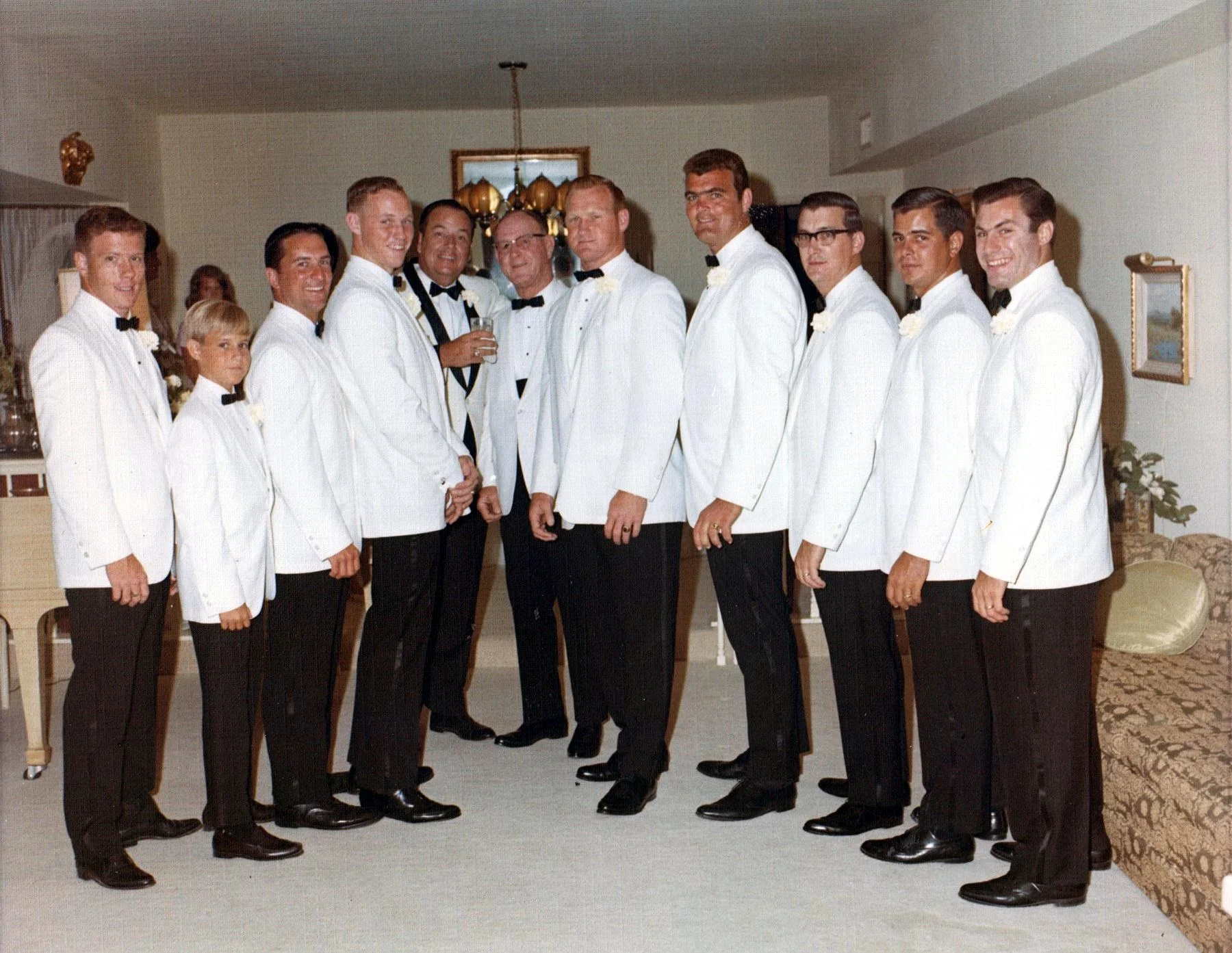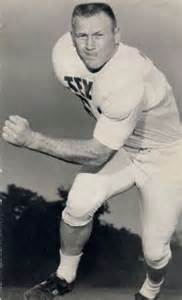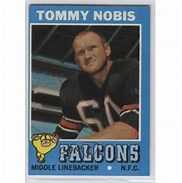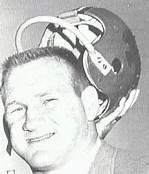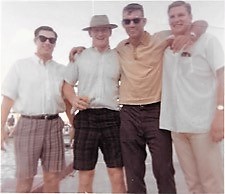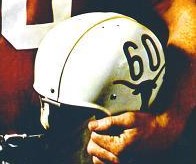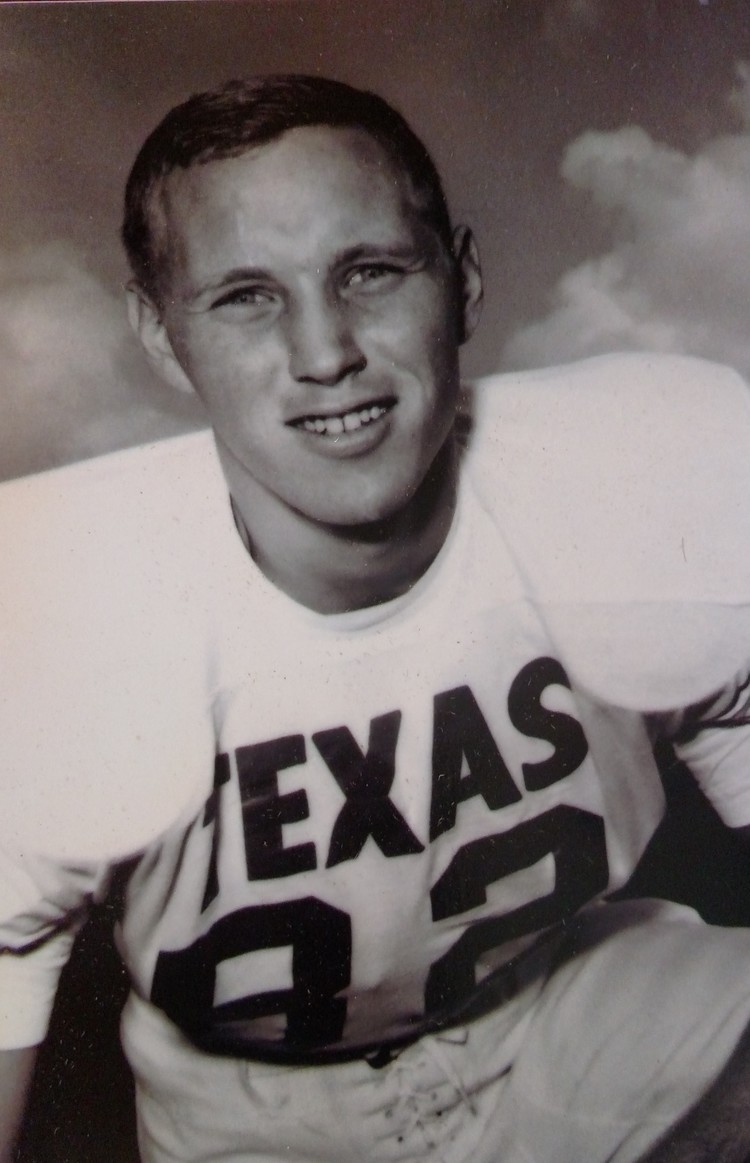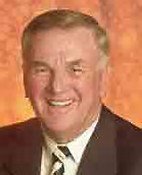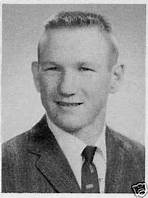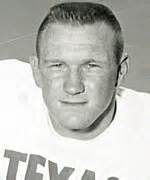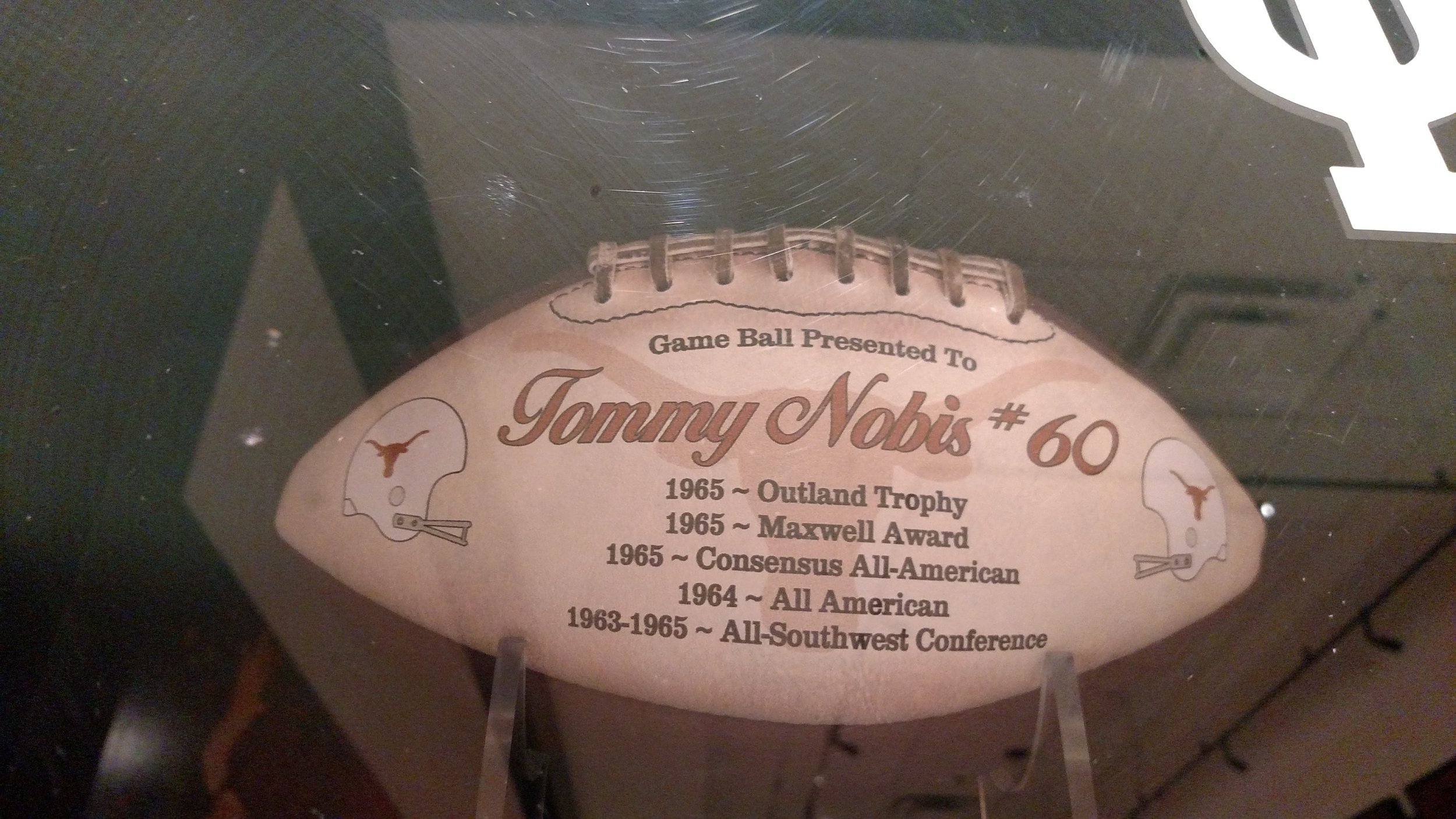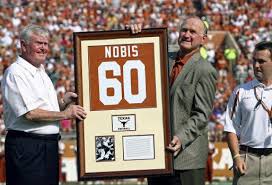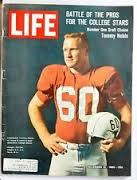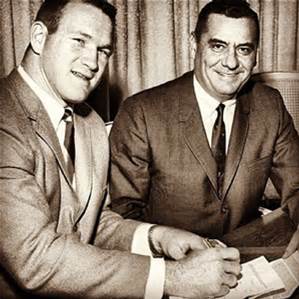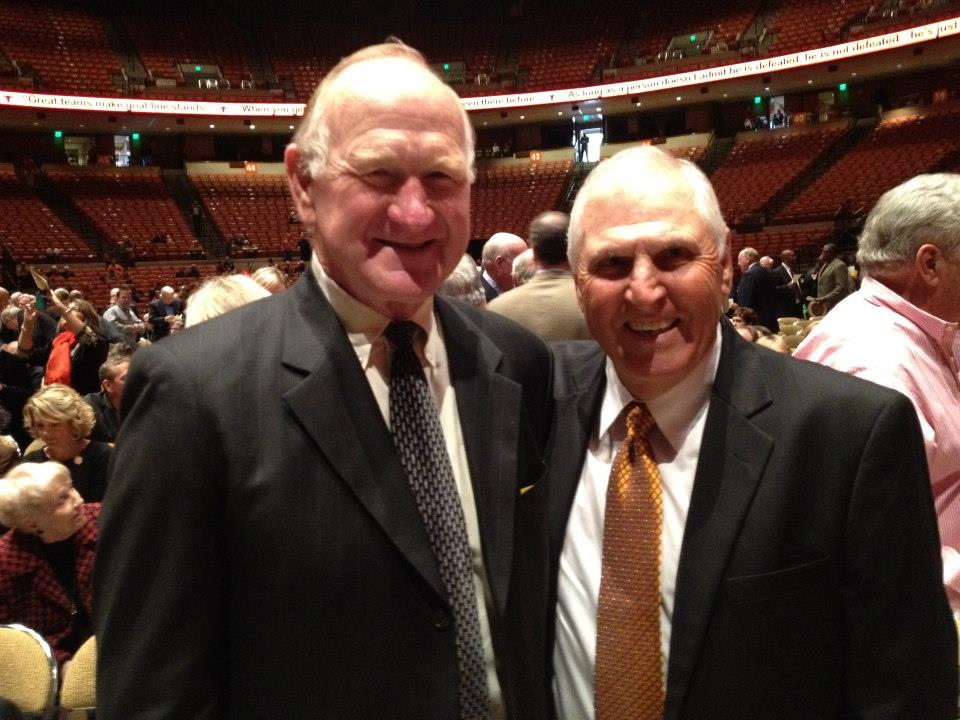“My biggest memories are the true excitement of the game day in Memorial Stadium- to stand out in the stadium at the start of a game, with the people standing up and singing “The Eyes of Texas.” I will remember those afternoons forever. It was a big motivator, and the whole scene kind of put things in perspective. You felt like you were not only playing for yourself and your teammates, but it gave you the feeling that you were playing for a lot of people. That song got me going.” Tommy Nobis
“It’s been a long time, but it was certainly a special experience. If you crank up ‘The Eyes of Texas’ and ‘Texas Fight’, I still get goosebumps.”
Remembering Tommy Nobis
DKR about Tommy Nobis: “Even his freckles had muscles .”
Barbara Wainscott 12/13/2017
My younger daughter texted me this afternoon while I was at Academy doing some Christmas shopping. It made me so sad. He was Loyd’s absolute hero and the first name out of his mouth when he was asked who was the best football player he ever saw. Tommy recruited Loyd and was a big part of the reason he chose to play at Texas. He respected him both on the field and off. After Loyd had two of his cancer surgeries and was scheduled for the third, Tommy called him one night as we were about to get out of the car at some friends’ house. He talked with him for twenty minutes and Loyd was so emotionally touched. I don’t know what he told him, but I remember the look on his face when he ended the call. He looked up at me with tears in his eyes and a smile on his face and said, “He’s really one of the good guys…and he’s my friend.”
Billy Dale 12/14/2017
I wrote most of the article below about Tommy Nobis in April 2017. Someone representing the mayor’s office in Atlanta, Georgia, read the article and asked if they could reprint it. I of course said yes with the comment “ I chose to be a Longhorn because of Tommy Nobis's influence on my life".
Coach Akers said tradition is " whatever it is that makes you feel bigger than you are and faster than you are." Coach Page, the women's basketball coach In 1973, said about traditions, "Intangibles Are Necessary. "It's Character And Pride...................It's The Things That Keeps People Performing When They're Tired.... It Can Be As Important As Money In Building A Program." Winning close games was great for Longhorn football, and the Texas iconic helmet became the national symbol of winning the "Longhorn way"- with talent, hard work, character, attitude, grit, backbone, and moxie. Tommy Nobis represents all the qualities of the great teams of the early Royal years. The "Tommy Nobis effect" on recruiting was a major reason the Longhorns had great teams from 1968 to 1974. Impressionable boys entering junior high school and High school in the early 60s wanted to be like Tommy.
Eugene Williams - comments on a special moment with Tommy Nobis
My heart is saddened at the loss of Lifetime Texas Longhorn and NFL Great Tommy Nobis. RIP#60 My very first radio guest were Tommy and DKR! I knew I had arrived!
Jo Anne Aune - recalls great memories
You may be too young to remember, but Tommy Nobis, Longhorn all-American and # 1 draft pick in 1966 (to Atlanta Falcons) 5 times Pro Bowl, died today at the age of 74.
He was from San Antonio, where he was a football great from Thomas Jefferson High School, my alma mater. His life-size picture probably still hangs over the entrance to the TJ locker room.
He was preceded in death by his little brother Joe, who, as a ‘67 Longhorn recruit with great promise, tragically drowned in Lake Travis in the Spring of ‘68.
RIP Tommy, you will always be our hero, and you are now at peace with Joe.
Ken Vaughn - remembers Tommy Nobis
My all-time idol, Tommy Nobis, has passed. What an outstanding Longhorn. I had the pleasure of visiting with him at Coach Royal's 80th birthday party. When I was 12 we were visiting Austin to buy a boat and there he was... lifting a 100-horsepower motor off the back of a boat at Austin Boats & Motors. My father looked at me and said "that's who you need to be like". He was something special. God bless him and his loved ones.
Royal once told the media “Aside from his super ability, he’s just one of those trained pigs you love. He’ll laugh and jump right in the slop for you.”
Transcending Time-Tommy Nobis
Revised 12/16/2018
Tommy Nobis was a Longhorn during Coach Darrell Royal's early years at Texas. Nobis and his teammates were Longhorn tradition builders. Winning "small" was the rule, not the exception, from 1958 to 1964 - but they did win! Winning small was good for the Longhorn franchise. Victories in close games enhanced the Longhorn brand and created passionate Longhorn fans. Winning traditions begin with intangibles; these teams were blessed with this asset.
Of course, many great players during Royal's early years at Texas built the Longhorn winning tradition. Still, for whatever reason -justifiable or not- Tommy Nobis received the most press.
The "Tommy Nobis effect" on recruiting was a significant reason the Longhorns had great teams from 1968 to 1974. Impressionable boys entering junior high and High school in the early ‘60s wanted to be like Tommy.
There is no better testimonial to the "Nobis effect" on Texas recruiting than the 1967 Longhorn first-year class. This recruiting class, which included Tommy Nobis's younger brother (Joe), is credited with a 30-game win streak and two National Championship teams.
Tommy Nobis inspired young boys to be Longhorns and his teammates to work harder and improve their skills.
Coach Royal hired Charlie Cravens in 1964 as the full-time instructor for the Men's Physical Training Program for all athletics. Cravens says, "Nobis was a great natural athlete but also a hard worker in the weight room."*
* ( It is hard to believe, but in 1963, many Longhorn coaches thought weight lifting was detrimental to developing football player skills and, therefore, chose not to focus on weight lifting as a primary source of strength and conditioning. )
Tommy Nobis disagreed with the coaches and chose to lift weights. Charlie Craven says that Tommy Nobis is the One player who made a big difference in the acceptance of weight training by both coaches and other players. Craven recalls, "At that particular time in our history (1963-1964), we were concerned with shoulder and neck injuries, and Tommy wanted his neck to be stronger than everyone. According to Craven, they fixed a special station for him so he could specifically train his neck, and "when the other athletes saw Tommy doing that, and they watched him play, that helped create our interest in strength training a lot."
Tommy’s workout regimen paid dividends. In his senior year at Texas in 1965, Nobis averaged 20 tackles a game and won the Outland Trophy and the Maxwell Awards.
The Substitution rule
Tommy Nobis was on the Longhorn team when the substitution rule was changed to allow platooning, but Royal was slow to implement this new rule, stating, "We're Going To Train Them (Players) Both Ways. We'll Specialize Them On Saturday".
In particular Royal Was Determined To Use Two Of His Best Athletes - Frank Bedrick And Tommy Nobis- Both Ways.
When a sportswriter asked Royal when he would fully implement the two-platoon system, Royal said: "When Tommy Nobis graduates." Tommy was a starter as a guard on offense and a linebacker on defense for all three years. Coach Royal Said Tommy Was "The Finest Two-Way Player I Have Ever Seen." Nobis acknowledged that Playing Guard Helped The Team, but His First Love Was Playing Linebacker. Tommy Told Bill Grimes With The AJC Staff, "The Excitement For Me Was Stopping A Guy For No Gain Or Knocking A Guy To Cause A Fumble." If you question Coach Royal’s Hyperbole about Tommy Nobis, then consider the following:
Wikipedia says that Tommy Nobis is one of college football's all-time greatest linebackers with an average of nearly 20 tackles a game;
All-State in high school, All American twice at Texas;
As a junior in the 1965 Orange Bowl, he makes one of the most famous tackles in the game's history. On fourth-and-inches, and clinging to a 21–17 lead, Nobis halts top-ranked Alabama and Joe Namath. The famous tackle in the Alabama game starts at the 3:00 minute mark in the link below;
Nobis finishes seventh in the Heisman voting;
Receives the Outland, Knute Rockne, and Maxwell award winners;
He is a 1976 inductee into The Longhorn Hall of Honor;
Is selected to the 1869-1969 All-Century team for both Sports Illustrated and the Walter Camp Football Foundation;
Is selected to the Football News’ All-Time All-America Team;
In 1982, is inducted into the College Football Hall of Fame. The Hall of Fame induction link follows https://youtu.be/H3fl_hjilxA ;
Nobis is an Inductee into the state of Texas, the state of Georgia, the city of Atlanta, and the city of San Antonio Sports Hall of Fames;
He appears on the front cover of Life Magazine and Sports Illustrated.
He is Atlanta’s first-ever draft pick;
1966 NFL Rookie of the Year;
Selected to the pro bowl in 1966,1967,1968, 1970, and 1972;
A member of the Atlanta Falcons Ring of Honor; and
An All-Decade Selection For The 60S To The Pro Football Hall Of Fame
Quotes about Tommy Nobis
Dolphins running back Larry Csonka: "I'd rather play against Dick Butkus than Nobis."
Cowboys’ legendary coach Tom Landry said, "Nobis was as fast as most backs. In my opinion, he was a super player."
Bears tight end Mike Ditka: "It was not one thing he did; it was everything he did. He was an old-fashioned linebacker. He didn't call attention to himself. He went out and played it."
Former Falcons head coach Dan Reeves: "I feel that Nobis' contributions on the field merit those of the Cowboys Hall of Fame players. Before the days of mass media and cable television, the play of Nobis stood a good chance of being missed due to the Falcons' lack of success during his tenure.
Coach Norm Van Brocklin pointed to Nobis' locker at the Stadium and proclaimed: "There's where our football team dresses." Tommy Nobis, as a rookie for the Falcons, had 296 tackles. It is still the single-season record for the Falcons.
Tommy Nobis's Most Important Legacy
Football injuries and Vietnam humbled Tommy Nobis, but with humility came self-evaluation, and from the depth of depression rose a new, more compassionate Tommy Nobis. Knee injuries caused self-doubt and a ‘why me “mentality. Vietnam cured him of both. Tommy was part of a USO contingent that visited Vietnam. After leaving the country and the fine young men fighting in Vietnam, he never again felt sorry for himself. Tommy said, “The Vietnam experience put my life in perspective as to how fortunate I was and how destructive war can be. His new view of life eventually leads to Nobis Works. That story follows.
To know the Tommy Nobis who transcends time, you need to know his heart. As Mike Hancock from Nobis Works says,
"Tommy is a legend on the field and a hero off the field."
His legacy of the heart began in 1975 before setting up tax-exempt charities was fashionable. Tommy Nobis established an organization to help the underprivileged and disabled acquire working skills. Jeff Van Note paid tribute to Tommy when he said, "There is no one in the history of sports in Atlanta that has given more back to the community of Atlanta than Tommy Nobis" and that "he is, by far, the greatest Falcon football player ever."
Tommy Nobis Is The Founder Of The Tommy Nobis Center. As such, he was honored With The Joseph P. Kennedy, Jr Award For His Support of The Georgia Special Olympics, NFL Man of The Year for his "Work From The Heart," and the 2008 recipient of the WXIA-TV Community Service Award for his Outstanding Contribution to the Community.
Tommy Nobis wanted to help people help themselves, and the Tommy Nobis Center was an essential step for many to acquire and maintain a job. He knew many proud individuals who wanted to work but who were unemployable without some training.
The Tommy Nobis Site Is Http://Nobisworks.Org/
In the 1980s, the Tommy Nobis Center expanded its mission to include employment opportunities and started a Federal Contracting Division (Nobis Enterprises) Housed In A 52,000 Sq. Ft. Facility In Marietta, Ga. Funds were raised from both private and public donations.
In 2006, the Center concentrated on community-based training sites and underwent another name change to Nobis Works.
Nobis Works provides training and employment services at 18 community-based locations around Metro Atlanta & the South.
As of 2012, NOBIS WORKS continued to grow. It now includes the Tommy Nobis Center, Nobis Enterprises, and Business Solutions. It is Georgia's second-largest nonprofit employer of individuals with disabilities.
After 40 years with the Atlanta organization, Tommy retired from football. He now suffers the consequences of all the punishing hits he meted out to opposing players during his college and professional football career. While his body and his mind struggle to recover from a sport that requires violent contact, his compassionate heart is as healthy as a 20-year-old Marathon runner. As of October 15, 2017, Tommy Nobis continues to keep on giving from the heart, and I pray that the rest of his body and mind recover from the impacts incurred during his "glory years" as one of the best football players in the history of college and professional sports. Billy Dale - a proud member of the 1967 Longhorn football recruiting class
"DANCE WITH WHO BRUNG YA " DKR
In 1975, Bobbie Knopf was chair of the Department of Special Education at Northside High School in Atlanta. At that time, she began a needs assessment dialogue with Joyce Slaughter, the mother of one of Bobbie’s students. They realized that the options available in North Atlanta for students with special needs after completing high school were limited.
As a result of the needs assessment, they formed an advisory board. Having heard of Tommy Nobis’ commitment to the Special Olympics and people with disabilities, the board approached the Atlanta Falcons All Pro Linebacker for support and named the project Tommy Nobis Center.
In 1977, Tommy Nobis Center hired Connie Kirk, who served as President & CEO for the next 39 years. Once incorporated, the Center’s team contracted with the Georgia Department of Labor’s Vocational Rehabilitation Program to provide vocational/work evaluations, social, personal, work adjustment services, job placement and job coaching for area clients.
In the 1980s, Tommy Nobis Center expanded its mission to include employment opportunities. To accommodate this expansion, the Center moved twice in the next decade, settling in 1992 in a 52,000 square-foot facility in Marietta, Georgia funded by public and private donations. In 1993, Nobis Enterprises was incorporated as the organization’s federal contracting division employing people with disabilities as an AbilityOne nonprofit agency. In 2015, Dave Ward was hired as President & CEO upon Connie Kirk’s retirement.
Today, Tommy Nobis Center continues to implement innovative programs and services to meet the employment needs of people with disabilities.
ABOUT TOMMY NOBIS
Tommy Nobis was one of the most prolific linebackers in the history of the NFL. Below is a recap of his incredible career and life after football.
CAREER RECAP:
Tommy was the first ever player drafted by the Atlanta Falcons organization in the inaugural 1966 season and quickly became the first ever Falcon voted to the Pro Bowl.“Mr. Falcon” led the team in tackles in nine of his 11 seasons, earning five trips to the Pro Bowl.After his 46th consecutive NFL game, he underwent knee surgery in 1969 and on the other knee in 1971. Known for his toughness, Nobis came back from both surgeries to earn another Pro Bowl spot in 1972.In a poll conducted in 1970 by ABC to pick the best athlete of the decade of the 1960’s, running back O.J. Simpson was number one, and Tommy Nobis was number two in the entire country.Tommy had an astronomical 294 total combined tackles as a rookie, still the team’s club record.Tommy also intercepted 11 passes during his professional career, returning two for touchdowns, and getting fined $100 each time for throwing the ball into the stands.His uniform #60 was the first one the Falcons ever retired, and the number has only been worn by him during the team’s entire history.
AWARDS:
Five-time Pro Bowler: 1966, 1967, 1968, 1970 and 1972.NFL Rookie of the Year in 1966.Voted into the Hall of Fame of the National Collegiate Football Foundation, the State of Texas Hall of Fame and the State of Georgia Hall of Fame.Named to Sports Illustrated’s All-Century Team (1869-1969).Named to CBS Sports All-Time All-America First Team of the best players in college football history.
COLLEGE CAREER:
As the most outstanding lineman in college football, he won both the Outland and Maxwell trophies at the University of Texas.Tommy played both offensive guard and linebacker for Darrel Royal on the Texas Longhorns team that won the 1963 national championship over Roger Staubach and Navy. In 1964, the 10-1 Longhorns beat Joe Namath and Alabama in the Orange Bowl.
With the same passion he devoted to football, Tommy dedicated his post-retirement life to helping people with disabilities find meaningful employment. He passed away on December 13, 2017, but his legacy lives on through the ongoing impact of Tommy Nobis Center.

